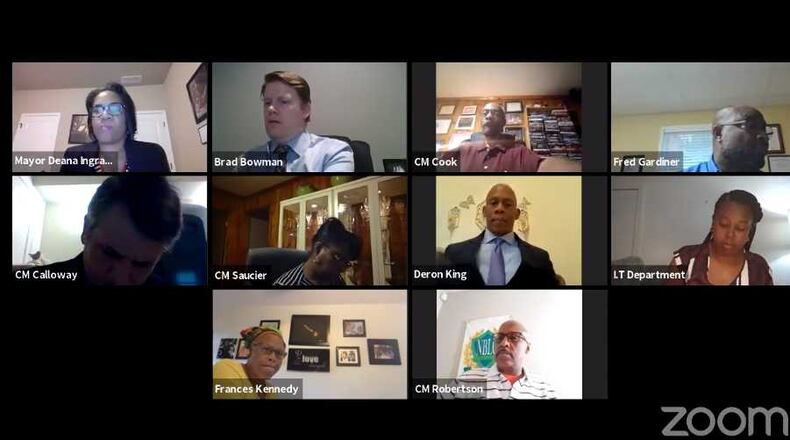Once again, COVID-19 is changing everything.
The rise of the omicron variant of the virus has businesses, government and everyday people reverting to tactics seen when the virus first emerged in 2020. On Wednesday, long lines were once again seen at testing sites. Cobb County reinstated a state of emergency.
As cases rise, restaurants and bars are closing their doors. Local governments are not far behind. At least two city halls have closed — in College Park and Avondale Estates — due to COVID-19.
Elected leaders across metro Atlanta are again deciding whether to meet in person or virtually. The decision isn’t as simple as it seems; the Georgia Open Meetings Act requires a majority of elected officials physically attend meetings. However, the act suspends that requirement “under circumstances necessitated by emergency conditions involving public safety.”
Avondale Estates is among the cities mulling whether meetings should go fully online.
“We will continue to take COVID and the expected omicron variant wave very seriously,” said Avondale Estates City Manager Patrick Bryant. “We will assess the situation upon our return (in January) to determine if meetings will continue in the hybrid version we have now ... or if they will move completely virtual.”
In DeKalb’s two largest cities, Stonecrest and Brookhaven, local leaders were taking similar approaches. Stonecrest City Hall remained closed to walk-in traffic and masks were required. The City Council expected to review new COVID-19 cases numbers at its next meeting in January to determine if in-person meetings would resume.
Brookhaven spokesman Burke Brennan said that city continues to monitor the situation and is “prepared to make changes as needed.”
“Our current emergency ordinance allows us the flexibility to return to virtual meetings if needed,” Brennan said.
Many cities began holding virtual meetings under Gov. Brian Kemp’s initial emergency order, in effect from March 2020 through June 2021. Kemp issued a subsequent “State of Emergency for Continued COVID-19 Economic Recovery” that was last renewed Dec. 17.
The Georgia Municipal Association, which advocates for municipal governments in the state Legislature, said Wednesday that cities do not need a statewide emergency order to hold virtual meetings.
“The virtual public meetings bill, that is now law, included local emergency declarations, allowing the city of Atlanta to hold virtual meetings under its own local state of emergency,” said GMA spokeswoman Amanda Coyne.
Atlanta City Hall has remained closed to the public throughout the pandemic, and its City Council meetings have been held virtually. The city resumed its mask mandate this week.
“Because the City of Atlanta remains under local, state, and federal declarations of states of emergency the Atlanta City Council is able to continue to meet by means of teleconference (remotely) in accordance with the Georgia Open Meetings Act,” said Communications Director Zena Lewis in a Tuesday email.
Without a state or local emergency declaration, a majority of elected officials must attend a meeting physically for it to be legal.
“Local governments can meet and have some members remote up to two times a year without a doctor’s excuse,” said Dave Wills, executive director of the Association of County Commissioners Georgia on Tuesday. “But a quorum of the body has to be present. So if you have a five-member mayor and commission or mayor and council and three of them are meeting in person, up to two more can participate remotely by telephone or video conference. Those other two can vote as long as a quorum is physically present. But if a quorum is not physically present, they could not vote unless there was a state of emergency in place.”
Some metro cities are sticking to in-person meetings, saying they are still legally required.
On Monday, Sandy Springs notified members of the public who attended a Friday meeting that an attendee was exposed to COVID-19. City officials gathered again Tuesday for a regular council meeting.
City Attorney Dan Lee said Thursday that the governor’s current executive order does not declare a public health emergency and if it did, Sandy Springs would still need data to support it in order to hold virtual meetings again.
“Just the existence of an executive order doesn’t allow for affecting something as sacrosanct as an open meeting to the public,” Lee said.
A Sandy Springs council member who joined Tuesday’s meeting remotely was not allowed to vote but Lee said that person didn’t invoke their right to use one of two calendar days in a year to attend virtually or provide a medical reason.
In DeKalb County, little has changed since the early weeks of the pandemic. The majority of county employees are still working remotely as much as possible and government meetings are still being conducted via teleconference. But county CEO Michael Thurmond said this week he and other senior leaders were discussing preparations for “what may be some very difficult weeks ahead.”
“Because of the increased transmissibility of the omicron variant, we are concerned that we have to take steps to protect our ability to deliver essential services to the citizens of DeKalb County,” Thurmond said during a Tuesday morning county commission meeting.
“This virus is not done with us yet,” he said.
-- Staff writers Leon Stafford, J.D. Capelouto and Brian Eason contributed to this report.





